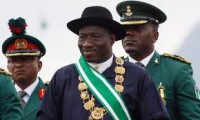
While the Global Commission report on Deepening Democracy provides insightful recommendations on strategies for improving electoral integrity, we must remember that elections are just one step in the democratic process. Certain precursors need to be made right in order to make the report’s recommended strategies achievable. Having lived in Nigeria and experienced the democratic process there, I am of the opinion that one vital measure needed to strengthen its nascent democracy is to drastically reduce the excessive financial incentives that accompany political positions. The quest for political leadership must be guided by a passion to lead and make changes. Sadly, these are noble incentives overshadowed by the “what is in for me?” mentality of personal gratification that has eaten deep into the fabric of the country’s political space.
In Nigeria, the salaries and allowances allocated to political office holders are amongst the highest in the world. Senators and members of the House of Representatives earn roughly $100,000 (US) monthly. This is one of the reasons for the “do or die” sentiment expressed by electoral contenders.
In a country with myriad development challenges, where more than 60 percent live on less than $1 per day, a Nigerian Senator cumulatively earns 8 times as much as an American Senator and at least 3 times more than the President of the United States. A local councilor in Nigeria earns more than a medical doctor who has been practicing for over a decade. This does not take into account corrupt practices, inflated contracts and kickbacks that are commonplace among some office holders. For example, in its 2012 budget the offices of the President and Vice President allocated a staggering $6 million for food and catering facilities.
Outsiders are envious. In an attempt to get in on the act, political contenders take on loans and amass huge debts from sponsors with the aim of paying them back as soon as they are in power. This only fuels their desperation and resolute determination to win elections by all means. Of course, some fall short and can’t pay their debts.
Meanwhile the minimum monthly wage is just $112. Although the government approved a pay rise of $6 after a series of protests by the Labour Union, it is yet to be implemented. With this reality, the temptation to join the gravy train is overwhelming — and to fight elections as if life depends on it. Indeed, the huge financial incentives attached to political office provide the basis for ordinary citizens to see political power as an opportunity to get out of poverty and amass wealth. Every Nigerian child wants to be a politician in the future, but sadly much of this may be for the wrong reasons.
The lessons from this are clear. A democratic process in which political positions are seen purely as a matter of public service with a responsibility to try and meet the aspirations of the ordinary citizens is likely to engender electoral integrity and healthy participatory government.
I fear little in the way of electoral reform can work until this financial roadblock is removed. Electoral fraud and violence is in part a byproduct of the cash-driven motivations of political contenders. And the wrong motivations likely lead to desperation and ultimately an attempt to sabotage the electoral process. Ultimately, ordinary citizens question the legitimacy of such power holders and the ensuing mistrust continues.
There is no doubt that some progress has been made in the Nigerian democratic process; but huge levels of mistrust between the citizens and government still remain. Even when the government tries to implement sound policies in the long term national interest, it is often met with resistance. A typical example is the fuel subsidy crisis last January, when the government wanted to remove the subsidy on fuel and re-channel the savings to develop other sectors of the economy. It was a sensible move. But citizens revolted, seeing the fuel subsidy as one of the few benefits they get from the government. Nigerians reasoned that the government had the moral imperative to reduce the cost of governance first. This led to a nation-wide strike and the impasse that followed only worsened the mistrust.
An ill-advised protest; but the people are right in part. Political office holders cannot continue to enjoy the largesse of fat salaries and allowances at the expense of the taxpayer. Nor can democracy thrive in the face of extreme inequality. It should convey a broad sense of commitment and purpose and reflect a heart–felt response to encourage the population to participate in the creative process, and to build a better future. But until the right motivations for political leadership and governance are in place, electoral integrity and Nigerian democracy will continue to suffer setbacks.
Temitope Folaranmi is an MPP student at the Blavatnik School of Government at the University of Oxford.
This post is part of our Deepening Democracy series, responding to a September 2012 report by the Global Commission on Elections, Democracy and Security, on improving the integrity of elections. The series is being curated by the Blavatnik School of Government and hosted on Politics in Spires. It features contributions from students on the Master of Public Policy course at the Blavatnik School, as well as guest posts from Oxford and Cambridge scholars in politics and international relations.








2 Comments
Its my prayer that the well articulated veiws expressed in this fine article will one day become a reality in our nation; with the current increasing rate of unemployment (PhD holders applying to be truck drivers),rising state of poverty, very poor level of infrastructural development and growing insecurity, Nigeria really needs an urgent rescue mission to save her from imminient collapse.
The only comment is that the govt must stop doing corruption to people